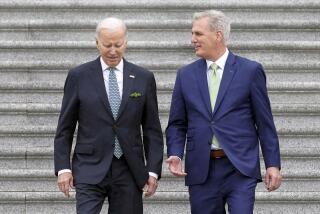Senate Democrats get 60 votes to move healthcare bill along
Reporting from Washington — The Senate took a giant step toward passing its sweeping healthcare bill early today, uniting fractious Democrats after months of debate over President Obama’s promise to reduce the ranks of the uninsured.
Breaking the Republican filibuster required the votes of all 60 members of the Democratic caucus. The cloture motion, which passed 60 to 40, capped months of work by Obama and Senate Majority Leader Harry Reid (D-Nev.), who personally negotiated compromises on big issues such as abortion and taxes, as well as parochial deals for key states and industries.
But with final Senate approval of the bill expected this week, Democrats and the White House were moving to shift the focus from their dozens of concessions -- such as jettisoning a government alternative to private health insurance -- toward the momentous changes they said it would bring: providing insurance access to 31 million more Americans, cracking down on insurance practices, and beginning to curb healthcare cost inflation.
“I wish this bill were different,” Assistant Majority Leader Richard J. Durbin (D-Ill.) said on the Senate floor Sunday, reflecting liberals’ unhappiness over some compromises with conservatives in the party.
“But my disappointment . . . shouldn’t lead me to conclude that this bill is wanting or this bill is bad. Just the opposite is true. . . . We have to look at the positive side of what this legislation will do.”
Opinion polls indicate that the public’s support for the healthcare overhaul is waning. Hoping to reverse that slide, Democrats and the White House are intensifying efforts to reshape public perception of the bill as a glass half full, not half empty.
“This is a historic crossroads,” David Axelrod, senior Obama advisor, said Sunday on NBC’s “Meet the Press.” “Seven presidents have tried to pass comprehensive health insurance reform, seven presidents have failed. We’re on the doorstep of getting it done.”
The Senate’s dramatic first vote to shut down the Republican filibuster capped a weekend session that marked the third time in the last month that the Senate has met on Saturday and Sunday. The vote, at 1 a.m. today Eastern time, was on whether to limit debate on Reid’s manager’s amendment, which includes the compromises required to unite the Democratic caucus.
Two more procedural votes will be needed before the bill comes to a final vote: On Tuesday to close debate over whether to insert the compromise language into the healthcare bill, and on Wednesday to close debate on the bill itself.
If all cloture motions pass -- as seems likely -- the Senate can vote on the bill itself before Christmas.
Republicans conceded that they were essentially powerless to derail the bill. But they vowed to force the debate to continue as long as possible -- probably until Christmas Eve.
“We will fight until the last vote,” Sen. John McCain (R-Ariz.), said on “Fox News Sunday.” “We must do everything. We must look back and say, ‘We did everything we can to prevent this terrible mistake from taking place.’ ”
In the death knell for Obama’s hope that the bill would receive at least token bipartisan support, Maine Sen. Olympia J. Snowe, the one Republican who even considered supporting the bill, formally announced Sunday that she opposed it.
“I deeply regret that I cannot support the pending Senate legislation as it currently stands, given my continued concerns with the measure and an artificial and arbitrary deadline of completing the bill before Christmas that is shortchanging the process on this monumental and transgenerational effort,” she said.
Her Maine colleague, Republican Susan Collins, also announced her opposition Sunday.
Other Republicans turned a spotlight on the special deals that were cut to win the support of Sen. Ben Nelson (D-Neb.). He provided the 60th vote after winning special treatment for his state’s Medicaid program, changes sought by insurance companies in Nebraska, and tighter restrictions on federal funding for abortion.
“This process is not legislation,” said Sen. Tom Coburn (R-Okla.). “This process is corruption.”
Democrats emphasized broad provisions of the bill that they said would provide concrete direct benefits to consumers but have been eclipsed in the final stages of the debate.
Among them, the Senate bill includes a “patient’s bill of rights” -- a package of consumer protections that, when they were considered on their own more than a decade ago, died amid heated controversy. Insurers would be prohibited from denying coverage for preexisting conditions and from rescinding coverage when policyholders become ill.
The bill also would seek to ensure that insurance companies use more of their premium income for patient services, not profits or administrative costs.
That was an important consolation prize for liberals who wanted a government insurance program that would have competed with private insurers.
“Now they must be accountable to consumers and spend more of their hard-earned dollars on actual healthcare and not on filling their coffers,” said Sen. John D. Rockefeller IV (D-W.Va.), who has led investigations of the health insurance industry.
Democrats hope that the more the public knows about such consumer-oriented provisions of the bill, the more the public will like it.
Public confidence in Democrats’ healthcare initiative has been sagging for months.
Today, 45% of Americans believe the country will be better off with “reform,” down from 59% in February, according to a tracking poll by the nonprofit Kaiser Family Foundation. And just 1 in 3 Americans believe that “healthcare reform” will leave them and their families better off, the lowest measure all year.
“People believe they will be paying more taxes,” said public opinion expert Robert Blendon of the Harvard School of Public Health. “They are afraid about what is going to happen to Medicare. . . . They have just gotten very nervous.”
And senior lawmakers in the House and Senate are about to begin another grueling round of debate and deal-making early next year.
A conference committee will begin trying to reconcile differences between the chambers’ versions of the bill, such as:
* Whether the measure should include a new government insurance program, as the House legislation currently does.
* How to pay for the legislation. The House bill relies heavily on a new surtax on high-income taxpayers, whereas the spending in the Senate bill is offset by a new tax on high-end “Cadillac” health plans.
* The abortion issue, which temporarily stalled both House and Senate bills in their final stages. The two measures restrict federal funding in different ways.
* Differing formulas for expanding the joint state-federal Medicaid insurance program for the poor.
* Differing mandates for employers to provide their workers with health benefits.
* Competing provisions for ensuring that illegal immigrants can’t buy health insurance.
* And many smaller differences in the way the two bills regulate insurance companies.
The negotiations could stretch for weeks or months.
Senate Democrats warned that any major divergence from their bill could demolish their fragile consensus and torpedo the bill.
“Anybody who’s watched this process can see how challenging it has been to get 60 votes,” Sen. Kent Conrad (D-N.D.) said on “Fox News Sunday.”
More to Read
Get the L.A. Times Politics newsletter
Deeply reported insights into legislation, politics and policy from Sacramento, Washington and beyond. In your inbox three times per week.
You may occasionally receive promotional content from the Los Angeles Times.












